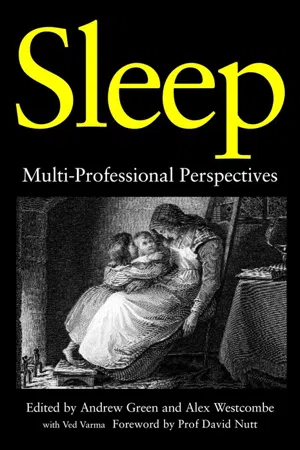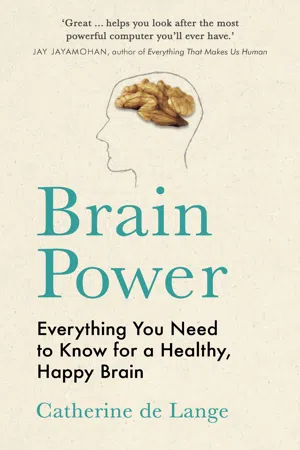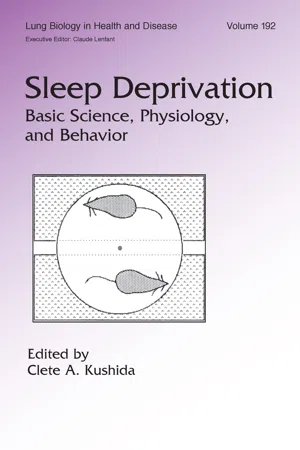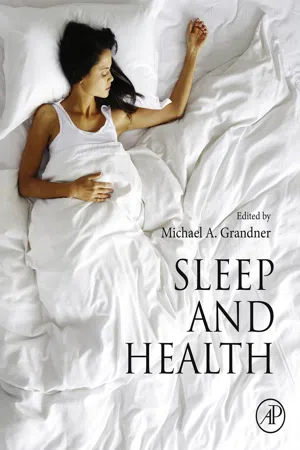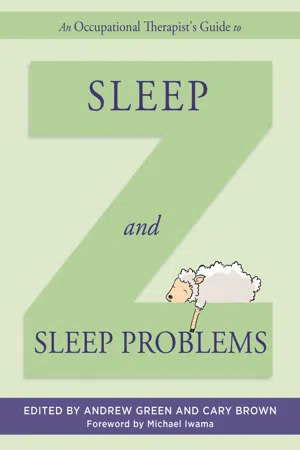Psychology
Functions of Sleep
The functions of sleep include physical restoration, cognitive processing, and emotional regulation. During sleep, the body repairs and regenerates tissues, while the brain consolidates memories and processes information. Sleep also plays a role in regulating emotions and maintaining overall well-being. These functions are essential for maintaining physical and mental health.
Written by Perlego with AI-assistance
Related key terms
7 Key excerpts on "Functions of Sleep"
- eBook - ePub
Sleep
Multi-Professional Perspectives
- Alex Westcombe, Andrew Green(Authors)
- 2012(Publication Date)
- Jessica Kingsley Publishers(Publisher)
However, emerging evidence suggests that this is not necessarily the case. Instead, sleep has evolved multiple functions to cope with the increasing sophistication of the nervous system and the ever-increasing volume of sensory information that must be processed in complex species. Numerous theories regarding specific sleep functions have been proposed, but none is well established (Siegel 2005). Energy conservation appears to be an important sleep function for many animals as this serves to optimize the timing and duration of behaviour and therefore prevents unnecessary activity at inopportune times. Nervous system recuperation and restoration is another important consideration – that sleep somehow reverses wake-related changes in brain function that may otherwise cause damage, such as depletion of energy stores and neuronal death. The role for sleep in neurogenesis, thermoregulation and the regulation of emotion is also being investigated. In humans, the ‘information-processing’ theories have been most studied so far. Sleep has a role in the reinforcement of learning and consolidation of memory, with distinct roles for NREM and REM sleep. Some research supports the formation of new brain connections during sleep whilst other research suggests that they are removed during sleep, thereby retaining important information and discarding non-essential information (Crick and Mitchison 1983; Meerlo et al. 2009). Studies have suggested that memories are replayed, modified, stabilized and enhanced during sleep, although there is disagreement about whether NREM, REM or both are required and to what extent they are involved (Stickgold 2005, 2006). Such research gives us reason to believe that there may be some truth in the concept of ‘sleeping on a problem’ and the saying, ‘sleep on it’ - Nancy Fenton, Jessica Flitter(Authors)
- 2015(Publication Date)
- Research & Education Association(Publisher)
Figure 7.1 Typical Sleep PatternsThe average sleep cycle lasts approximately 90 minutes and is repeated four to six times per night. Throughout the night the amount of time spent in the REM stage increases and the amount of time spent in stage 4 sleep decreases. See Figure 7.1.Sleep Deprivation and Functions of SleepAlthough a few individuals have stayed awake for up to ten days, most people find the need to sleep to be one of the most overpowering urges they have ever experienced. Sleep deprivation studies provide psychologists with an opportunity to better understand the importance of sleep and how deprivation affects physical and cognitive processes. Longterm extreme sleep deprivation has been associated with the development of psychotic symptoms, including hallucinations and delusions in some individuals. Chronic sleep deprivation tends to reduce attention levels, especially for repetitive tasks, reduce reaction time, increase negative emotions, reduce immunity, and increase weight gain. Most sleep-deprived individuals begin to take microsleeps , or naps that last only a few seconds. Individuals are often not aware that they are having these short lapses in consciousness, which can be very dangerous because they may lead to car accidents.What is the purpose of sleep? Several different theories have been proposed regarding the function of sleep. One theory states that sleep was naturally selected to help keep animals and humans out of harm’s way and allow for the conservation of energy. Another theory for sleep’s function is that it gives the body a chance to rest and repair itself. Also, because of the fact that growth hormones are released mainly during sleep stages 4 and 3, it is possible that sleep plays a critical role in the growth process. Finally, recent research has demonstrated that sleep may be necessary in order for the brain to consolidate new memories and for learning to occur. Individuals who slept not long after learning new material were better able to retain and retrieve the information they learned. Furthermore, participants who slept after learning were more successful at evaluating the information they learned, resulting in the ability to make more innovative connections. Participants in the study who did not sleep after exposure to the new material did not have as much success. In variations of this study, it was discovered that, regardless of the time of day during which the experiment was done, participants who slept were better able to recall the new information.- eBook - ePub
Brain Power
Everything You Need to Know for a Healthy, Happy Brain
- Catherine de Lange(Author)
- 2022(Publication Date)
- Michael O'Mara(Publisher)
PART 2SLEEPSleep is one of the most paradoxical things we do. If we think about it in evolutionary terms, it doesn’t seem to make sense for animals, including humans, to switch off our conscious awareness on a daily basis, turning us into sitting ducks for prowling predators. And yet all animals do it. We humans spend a third of our lives sleeping. So you’d expect sleep to have an obvious purpose, something so absolutely vital that it outweighs the deadly risks.And yet we are still far from understanding the purpose of sleep. Fortunately, research has given us plenty of ideas about why we do it, several of which are discussed in the following chapters. One clear and important role of the sleeping brain is to help us lay down new memories and connect them up to those we already have (see Chapter 5 ). Without memory there would be no learning, and it is arguably in part the ability to learn that has got us where we are today as a species, so perhaps this is the trade-off for the vulnerability that comes with sleep.Technologies that allow us to study the sleeping brain have also shed light on exactly what happens inside our heads during those unconscious hours, and a mountain of evidence is revealing just how important it is for mental health and for keeping our brains in shape as we age. For instance, sleep seems to be an important piece of the Alzheimer’s puzzle, as we discover in Chapter 6 – an exciting idea that could lead to new ways to detect, prevent and even treat the disease.Some elements of sleep – most notably dreaming, another mysterious element of our state of slumber – also seem to play an important role in processing our emotions, with important consequences if we don’t get enough.And whatever the true purpose of sleep, we all know from experience how terrible a bad night can make us feel. Not getting enough shut-eye, or sleeping at the wrong times, can be dangerously detrimental to our cognitive function, as we explore in Chapter 7 , and impacts on our mental health, as we see in Chapter 8 - eBook - ePub
The Dream Experience
A Systematic Exploration
- Milton Kramer(Author)
- 2013(Publication Date)
- Routledge(Publisher)
How depressed or anxious a person is before going to sleep has been shown to alter how well one sleeps (Rimon, Fujita, & Takahata, 1986; Rosa, Bonnet, & Kramer, 1983). From a psychological perspective, the more intense the emotional experiences of the day (Piccione, Jacobs, Kramer, & Roth, 1977) and the thoughts a person has before going to sleep (Kramer, Moshiri, & Scharf, 1982; Piccione, Thomas, Roth, & Kramer, 1976; Kramer, Roth, Arand, & Bonnet, 1981), they are likely to appear in the dreams of the subsequent night’s dreams. Sleep is clearly responsive to the experiences that precede it during the day.The physiological and psychological aspects of sleep are also related to the waking activity of the next day. How well one performs on various psychomotor tasks following a night’s sleep is influenced by even small alterations in the number of hours of prior sleep; for example, decrements in performance can be shown with even a one hour reduction in prior sleep (Wilkinson, 1968). Feeling states are predictive of performance (Lutz, Kramer, & Roth, 1975) and feeling states on arising are better predictors of performance during the day than the prior total hours of sleep (Johnson, Spinweber, Gomez, & Matteson, 1990). Mental activity in the morning is linked to the dreams of the prior night (Kramer, Moshiri, & Scharf, 1982). There is a thematic continuity between the dreams of the night and the spontaneous verbal behavior of the following morning. Wakefulness is responsive to the experiences during sleep that preceded it. Sleep is linked both to prior and subsequent wakefulness in both its physiological and psychological aspects.The possibility that sleep functions to alter the subjective state of the person seems plausible. An exploration of the sleep-mood interaction should look at the relationship of both the psychology and physiology of sleep to waking mood. A systematic study of the mood-sleep relationship will be described starting from relatively normal situations and extending them to more extreme circumstances. Mood appears to vary from day to day, across the day, and might well bear a relationship to both dreams and sleep physiology.b. The Measurement of Mood - eBook - ePub
Sleep Deprivation
Basic Science, Physiology and Behavior
- Clete A. Kushida(Author)
- 2004(Publication Date)
- CRC Press(Publisher)
Around this time, sleep researchers began to recognize the consequences of daytime sleepiness on safety and productivity. Investigators realized that the symptom of the drive to sleep, i.e., sleepiness, has its own significance. Sleepiness can be compared to thirst. Thirst in and of itself is neither dangerous nor damaging; it is the dehydration, of which thirst is a symptom, that is important. Given a valid objective method for the study of the nocturnal determinants of daytime sleepiness, investigators began to explore the connection between partial sleep loss and daytime sleepiness and other behavioral impairments, independent of searching for a vital function or Functions of Sleep.V. The Function(s) of Sleep
We will briefly review selected theories of the function(s) of sleep that have received attention in the past but have not received conclusive exploration. These theories are still relevant today.A. Body Restitution Hypothesis
In 1969, Ian Oswald proposed the body restitution hypothesis, postulating that “REM sleep rebound may indicate increased protein synthesis in the brain.” He believed that brain repair occurs during REM sleep and that NREM sleep exists for bodily restitution (39 ). Kristin Adam concurred with Oswald’s theory citing the observation that “rates of protein synthesis or of mitotic division are higher during the time of rest and sleep” as evidence for restitution (40 ). In 1978, Jim Horne reviewed the biological effects of total sleep deprivation in humans and discounted the body restitution hypothesis. However, he proposed a CNS or cerebral restitutional role for human sleep (41 ). In 1985, Horne revisited the effects of total sleep deprivation in humans again and concluded that it results in impaired homeostatic control, especially thermoregulation, which is significant in small mammals but has a minor role in humans. He proposed that only a certain portion of a night’s sleep is essential to the brain, with the remainder being optional (42 - eBook - ePub
- Michael A. Grandner, Michael Grandner(Authors)
- 2019(Publication Date)
- Academic Press(Publisher)
Introduction
We live in a society that operates around the clock, often forgetting that sleep is important. In fact, insufficient sleep has become a public health epidemic and is often overlooked as a serious problem [1] . While the National Sleep Foundation recommends adults sleep > 7 h per night [2] , 35% of adults in the United States sleep less [3] . Most people have suffered from sleep loss, either chronic or acute, at some point in their lives whether it be due to a new baby, stress, studying for an exam, or other circumstances. However, many people fail to realize the negative impact sleep loss has on cognitive functioning and how this has far-reaching real-world implications. In fact, insufficient sleep is common in several safety-critical occupations, including medical professionals, military personnel, airline pilots, and truck drivers, just to name a few. Thus, it is important to understand how sleep loss impacts various aspects of cognition.The present chapter provides an overview of the effects of sleep loss on several major cognitive domains. First, it is important to discuss the underlying neurobiological mechanisms that regulate sleep and wake, and thus modulate cognitive performance. We must also appreciate that human cognitive capacities are complex, with higher-order processes (e.g., executive functions, decision-making) building upon a foundation of elementary processes (e.g., attention). Therefore, this chapter will offer a discussion of how sleep loss impairs alertness, sustained attention, and vigilance. Additionally, we will discuss the importance of considering how inter-individual differences are related to relative resistance or vulnerability to cognitive impairment. We will then build upon these elementary capacities and focus on the consequences that sleep loss has on several complex executive function domains including working memory, inhibitory control, cognitive control, problem solving, risk-taking, and decision-making. - Andrew Green, Cary Brown(Authors)
- 0(Publication Date)
- Jessica Kingsley Publishers(Publisher)
5 THE EFFECTS OF SLEEP AND SLEEP LOSS ON PERFORMANCE Andrew Green and Chris Alford 5.1 IntroductionThe associations between sleep loss and poor health are mentioned in Chapter 3 (see also Möller-Levet et al. 2013); these are long-term consequences, but sleep loss has consequences in the very short term. Although most people will have noticed a difficulty in concentrating, or just staying awake after a bad night, or when experiencing jet lag, we might not always be so aware of how much our performance is impaired by as little as one night’s poor sleep. This chapter therefore emphasizes the importance of sleep by focusing on the psychological and performance deficits that result from sleep deprivation. It shows why it is important to take patients’ sleep problems seriously and provides the evidence for advising caution when sleep is impaired – even if an individual does not complain of poor sleep.The mechanisms by which sleep deficit affects cognitive function are complex, but Alhola and Polo-Kantola (2007) suggest a broad two-way classification of theories whereby there are ‘general effects on alertness and attention or selective effects on certain brain structures and function’ (p.554). These theories are explored briefly before a more detailed look at some of the key performance areas that are affected by sleep loss: alertness in driving and similar tasks, and cognitive performance in memory and learning. Lastly, implications for clinical practice are considered.5.2 MechanismsAccording to the wake-state instability hypothesis, lapses of attention result from the homeostatic pressure to sleep causing microsleeps* which have the characteristic electroencephalogram (EEG)* activity of sleep. This is in line with the synaptic homeostasis hypothesis (see Chapters 3 and 6 ), which suggests that if the brain is deprived of the chance to go offline in an orderly fashion in night-time sleep, certain parts will go offline in a more haphazard manner as wakefulness persists (Lucassen et al.
Learn about this page
Index pages curate the most relevant extracts from our library of academic textbooks. They’ve been created using an in-house natural language model (NLM), each adding context and meaning to key research topics.
